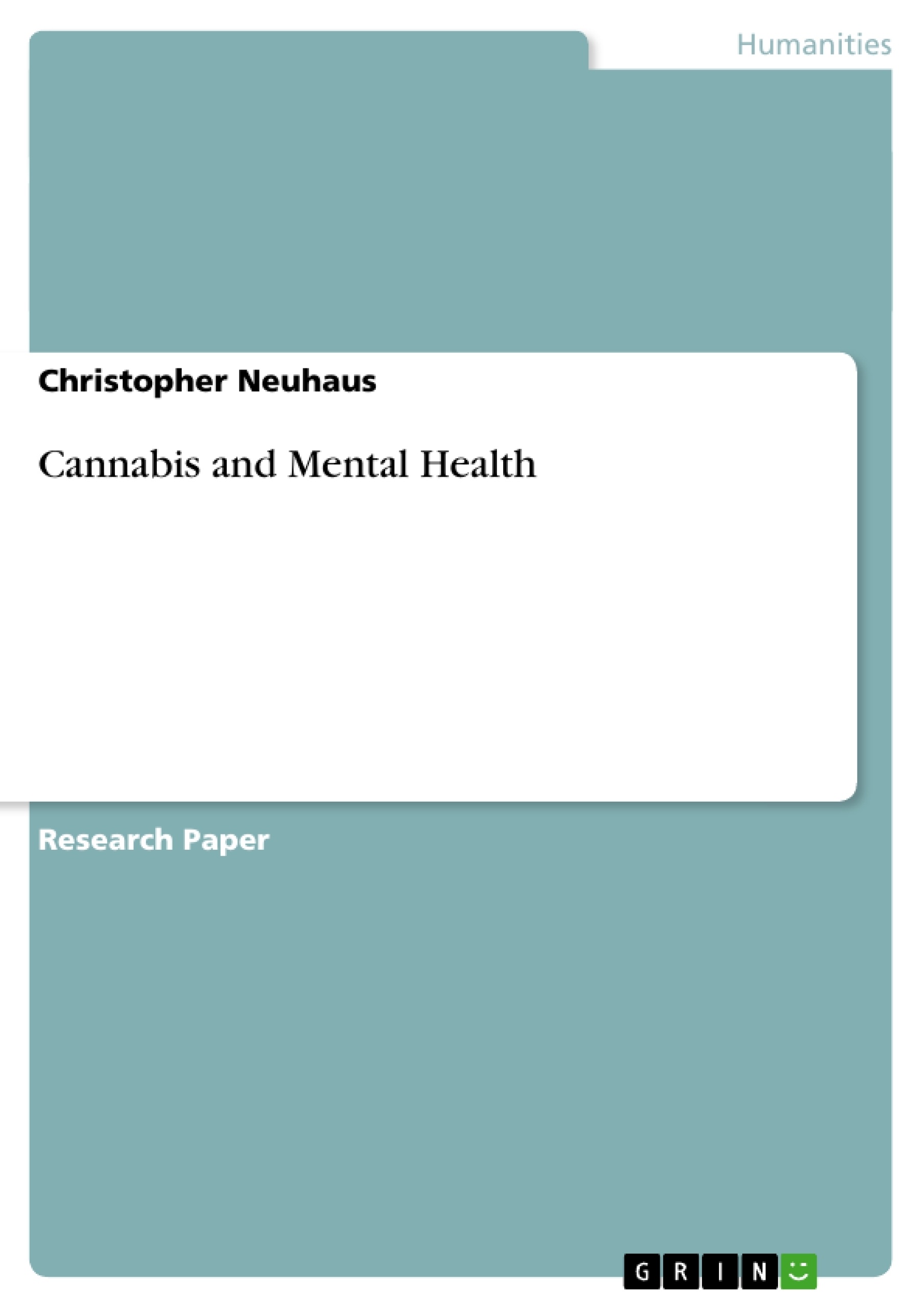This paper explores the long term effect of cannabis on mental health. These studies prove a clear correlation between cannabis use and mental health disorders, however, none of the them conclude that cannabis is the sole cause of the development of the disorders. such as, schizophrenia, bi-polar disorder and depression.
Keywords: Delta-9-tetrahydrocannabinol (∆9-THC), Cannabidiol (CBN), Cannabinol (CBC), schizophrenia, depression, bi-polar disorder
Inhaltsverzeichnis (Table of Contents)
- Cannabis and Mental Health: The Effect of Cannabis on Schizophrenia and Depression
- Cannabis and Mental Health Disorders
- Cannabis Use Among Schizophrenic Patients
- The Role of Delta-9-Tetrahydrocannabinol (A-THC)
- Follow-up Studies on Cannabis Use and Schizophrenia
- The Role of Cannabidiol (CBD)
- Case Study: Cannabidiol Treatment for Schizophrenia
Zielsetzung und Themenschwerpunkte (Objectives and Key Themes)
This paper examines the long-term effects of cannabis on mental health, specifically focusing on the relationship between cannabis use and the development of schizophrenia and depression. The paper investigates the role of both the psychoactive cannabinoid Delta-9-tetrahydrocannabinol (A-THC) and the antipsychotic cannabinoid Cannabidiol (CBD) in influencing mental health outcomes. The key themes explored in this paper include:- The correlation between cannabis use and the development of schizophrenia and depression
- The potential role of Delta-9-tetrahydrocannabinol (A-THC) in the development of schizophrenia
- The potential benefits of Cannabidiol (CBD) as an antipsychotic treatment for schizophrenia
- The challenges of establishing causation between cannabis use and mental health disorders
- The importance of considering pre-existing vulnerabilities and genetic predispositions in understanding the relationship between cannabis and mental health.
Zusammenfassung der Kapitel (Chapter Summaries)
The paper begins by examining the long-standing debate about the association between cannabis use and mental health disorders, particularly schizophrenia and depression. It highlights the challenges of differentiating correlation from causation in research on this topic. The paper then delves into the role of Delta-9-tetrahydrocannabinol (A-THC) in the development of schizophrenia. It examines two major follow-up studies that demonstrate a correlation between cannabis use and an increased risk of schizophrenia. However, the paper emphasizes that these studies cannot conclusively prove causation due to limitations in controlling for other factors, including pre-existing vulnerabilities and other drug use. The paper then explores the potential benefits of Cannabidiol (CBD) as an antipsychotic treatment for schizophrenia. It discusses the antipsychotic properties of CBD and highlights research indicating its effectiveness in treating schizophrenia with fewer side effects compared to traditional antipsychotic medications. Finally, the paper presents a case study of a schizophrenic patient who experienced significant improvement when treated with Cannabidiol. However, the paper acknowledges the limitations of this single case study and emphasizes the need for further research on a larger population base.Schlüsselwörter (Keywords)
This paper focuses on the relationship between cannabis use and mental health, specifically exploring the connection between cannabis and the development of schizophrenia and depression. Key terms include: Delta-9-tetrahydrocannabinol (A-THC), Cannabidiol (CBD), cannabinoid, schizophrenia, depression, correlation, causation, follow-up studies, case study, antipsychotic effects, and pre-existing vulnerabilities.Frequently Asked Questions
Is there a proven link between cannabis use and schizophrenia?
Studies show a clear correlation between cannabis use and an increased risk of schizophrenia, although research has not yet concluded that cannabis is the sole cause of the disorder.
What is the role of Delta-9-tetrahydrocannabinol (A-THC) in mental health?
A-THC is the psychoactive component of cannabis. Research suggests it may trigger or worsen symptoms of schizophrenia, particularly in individuals with pre-existing genetic vulnerabilities.
Can Cannabidiol (CBD) be used to treat schizophrenia?
Yes, research indicates that CBD has antipsychotic properties. Some studies show it can be as effective as traditional antipsychotic medications but with fewer side effects.
Does cannabis use cause depression?
While there is a correlation between cannabis use and depression, establishing a direct causal link is difficult due to factors like pre-existing mental health conditions and the use of other substances.
Why is it hard to establish causation in cannabis research?
Researchers struggle to control for variables such as genetic predisposition, environmental factors, and whether individuals use cannabis to self-medicate existing symptoms (reverse causation).
What are the long-term effects of cannabis on mental health?
Long-term use is associated with a higher risk of developing chronic disorders like schizophrenia, bi-polar disorder, and major depression, especially when use begins at a young age.
- Arbeit zitieren
- Christopher Neuhaus (Autor:in), 2011, Cannabis and Mental Health, München, GRIN Verlag, https://www.grin.com/document/210777



